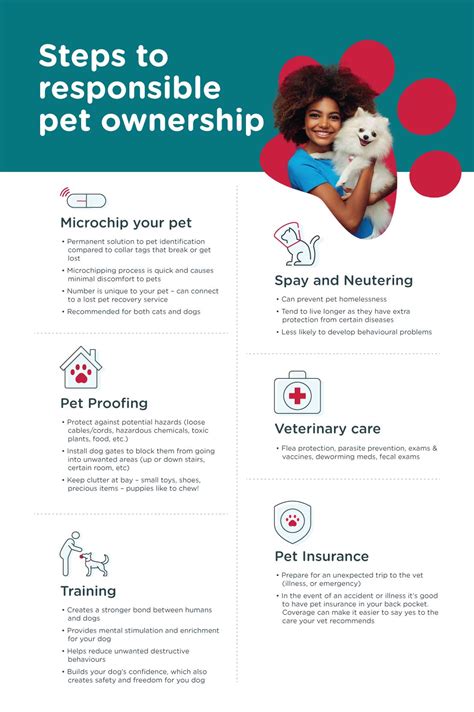Introduction
Pet ownership is a rewarding experience that comes with great responsibilities. Before bringing a furry friend into your home, it’s crucial to understand the commitment and care required to ensure their well-being.

Benefits of Pet Ownership
- Companionship: Pets provide companionship and reduce feelings of loneliness, especially for seniors and those living alone.
- Physical Activity: Walking, playing, and grooming pets encourage physical activity for both pets and owners.
- Emotional Support: Pets offer emotional support during stressful times, reducing anxiety and depression.
- Educational Value: Caring for pets teaches children about responsibility, empathy, and the natural world.
- Improved Cardiovascular Health: Studies show that pet owners have lower blood pressure and cholesterol levels, contributing to better heart health.
Responsibilities of Pet Ownership
1. Providing Food and Water
- Ensure pets have access to fresh food and water daily.
- Choose age-appropriate and species-specific diets.
- Monitor water intake to prevent dehydration.
2. Grooming
- Regular grooming helps maintain pets’ hygiene and prevents skin problems.
- Brush fur, bathe, and trim nails accordingly.
- Check for parasites and seek veterinary attention if necessary.
3. Veterinary Care
- Vaccinations protect pets from diseases and are crucial for their health.
- Schedule regular checkups to ensure early detection and treatment of any health issues.
- Emergencies can occur, so have a plan for after-hours veterinary care.
4. Exercise and Mental Stimulation
- Pets need regular exercise to stay healthy and prevent boredom.
- Engage in activities such as walks, playtime, or puzzle toys.
- Provide mental stimulation with interactive toys and training.
5. Training and Socialization
- Train pets on basic commands (e.g., sit, stay, come) to ensure safety and control.
- Socialize pets with other animals and people to avoid behavioral problems.
- Start training and socialization early for optimal results.
Financial Considerations
- Initial Expenses: Acquiring a pet, including adoption fees, equipment, and veterinary care.
- Monthly Expenses: Food, treats, toys, grooming supplies, and veterinary checkups.
- Emergency Expenses: Unexpected veterinary care, medications, or pet boarding.
- Insurance: Consider pet insurance to cover unexpected medical expenses.
Decision Time: Pros vs. Cons
| Pros | Cons |
|---|---|
| Unconditional love and companionship | Time commitment |
| Improved health and well-being | Financial expenses |
| Educational value for children | Potential for damage to property |
| Emotional support during difficult times | Travel restrictions |
| Increased physical activity | Shedding and allergies |
Case Study: Max the Golden Retriever
Max, a 5-year-old golden retriever, has been a constant companion to his owner, Emily. Max’s presence has reduced Emily’s stress levels and encouraged her to engage in more physical activity. However, Emily also acknowledges the financial burden of Max’s care, including monthly veterinary checkups and visits to the groomer.
Strategies for Responsible Pet Ownership
- Research: Gather information about the specific breed you’re considering.
- Time Commitment: Ensure you have sufficient time to care for a pet before making a commitment.
- Financial Planning: Budget for all potential expenses associated with pet ownership.
- Create a Schedule: Establish a routine for feeding, grooming, exercising, and veterinary care.
- Seek Support: Join pet owner groups or consult with veterinarians for guidance and support.
Tips and Tricks
- Involve Family: Allocate responsibilities to family members to ensure shared care.
- Use Technology: Utilize pet monitoring devices and apps to ensure your pet’s safety and well-being.
- Create a Pet-Friendly Home: Designate specific areas for sleeping, eating, and playing.
- Consider a Pet Sitter: Arrange for pet care during vacations or unexpected absences.
- Be Prepared for the Long Term: Pets have lifespans of 10-15 years or more, so be prepared for a long-term commitment.
Conclusion
Pet ownership is a mutually beneficial relationship that requires a deep understanding of responsibilities and rewards. By providing adequate care, financial stability, and emotional support, pet owners can enjoy the unconditional love and companionship that animals bring to their lives. Remember, a pet is a lifetime commitment, not just a short-term fix.





















